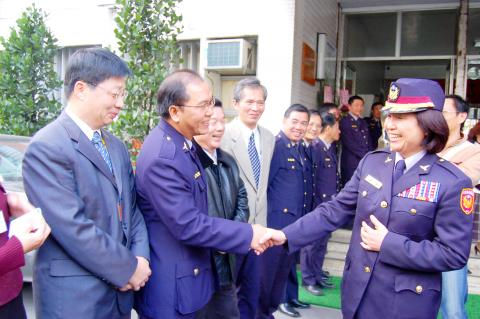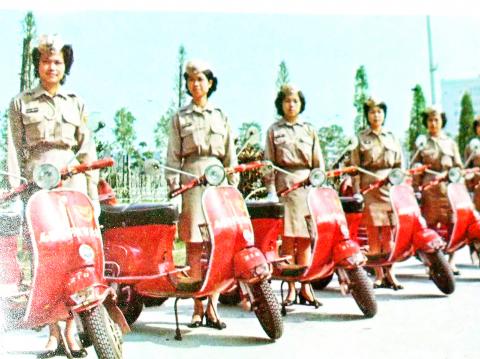March 4 to March 10
Hsieh Fen-fen (謝芬芬) almost became Taiwan’s first female police precinct head in 1998, but then-Taipei mayor Chen Shui-bian (陳水扁) changed his mind after Hsieh’s high-ranking male colleagues voiced their opposition. It didn’t matter, though, as Hsieh would earn a higher position on March 5, 2003 when she was sworn in as Taiwan’s first female police bureau chief during Chen’s first term as president. It was another “female first” on her resume — two years earlier, she made history as the first female security department chief at the Presidential Office.
In late February 2003, Hsieh was among three finalists for the Yilan County Police Bureau Chief position, which was to be decided by Yilan County Commissioner Liu Shou-cheng (劉守成). News reports speculated that the “hard working” Hsieh, who had recently joined the Democratic Progressive Party (DPP) and had the backing of the Chen administration, would get the job.

Photo: Hu Chien-sen, Taipei Times
“As long as that person is serious, proactive, displays good conduct and can work well with the county government, family background and gender should not be an issue,” Liu said three days before he picked Hsieh.
According to government statistics from last month, 10.6 percent of Taiwan’s police force were women by the end of last year. This number has jumped significantly over the past decade from 3.6 percent in 2004 — the year the Central Police University began allowing married women to apply. The goal of the policy was to get the number up to 4 percent, one that was achieved by the end of 2006.
“Let’s not focus so much on gender when we’re discussing the workplace. That’s outdated. But women should not limit themselves either. We need as much room as possible to grow,” Hsieh said in response to the university’s decision.

Photo: Liu Ching-ho, Taipei Times
FEMALE OFFICERS
There were no female police during the Japanese colonial era, but under former president Chiang Kai-shek’s (蔣介石) national mobilization policy, both men and women were expected to contribute to the cause of “saving the country.”
Taiwan’s first female police cadets joined the Taiwan Provincial Police Training Facilities (today’s Taiwan Police College) in December 1947. Sixty-one women enrolled that year, followed by 36 the following year. Their roles were quite limited, and the academy stopped accepting women between 1951 and 1955 due to the lack of tasks they were deemed capable of performing. Recruitment soon stopped again, not resuming until 1969 after Taipei was upgraded to a special municipality and needed extra law enforcement personnel.
In 1951, the Female Police Division (女子警察隊) was established in Taipei. Their tasks included disaster relief, local security and working with women — for example, discouraging women from gambling and prostitution and helping them find regular employment, as well as domestic violence, runaway and missing person cases.
The duties for female officers were laid out in 1956: protecting women and children, household registration, checking on the welfare of adopted daughters and sex workers, general security, conducting traffic and investigating cases related to women and children. However, in the early years, most female officers were limited to internal or office tasks.
Under military rule, the roles of female officers expanded slowly. A Central Daily News (中央日報) report shows that between 1956 and 1968, Taipei’s female police force only increased by about 10 members.
Things remained this way until the women’s rights movement emerged in the early 1970s. The Central Police University opened its doors to females in 1973, though they were limited to 10 percent of the entering class. Taipei also bolstered its female police division to 61 people. Kaohsiung also established a female division in 1970. It wasn’t until the early aughts that all counties and municipalities had female divisions.
MANY FIRSTS
Hsieh started out in the Taipei City Police Department’s Female Police Division, which has since been renamed the Women’s and Children’s Protection Division (婦幼警察隊). According to an article in the Liberty Times (sister paper of the Taipei Times), following the death of her husband, Hsieh studied hard and was accepted to Central Police University, graduating in 1987.
From the division’s deputy chief, she was promoted to head of then-Jingmei Precinct’s first division — the first female two-stripe, three-star field division chief.
She made many changes to the female division, setting up its first crime prevention and women and children protection division, “breaking the stereotype that women cannot solve cases,” the article states.
With the support of her male colleagues, the female police officers under Hsieh took on field cases for the first time, locking away car thieves and drug dealers as well as investigating missing persons cases, especially those involving underage and abused women.
As Taiwan’s first female Juvenile Affairs Division chief, Hsieh launched the “Spring Wind Program” (春風專案) which focused on keeping minors out of certain establishments after midnight.
Meanwhile, Chen lost his bid for re-election for Taipei mayor to Ma Ying-jeou (馬英九) in 1998, and the honor of being Taiwan’s first female precinct head was taken by Lee Li-chuan (李莉娟), who was best known for her role in the arrest of Wu Hsin-hua (吳新華), a man involved in 14 murders between 1981 and 1986.
Hsieh served as education division chief for the National Policy Agency before eventually retiring.
Taiwan in Time, a column about Taiwan’s history that is published every Sunday, spotlights important or interesting events around the nation that have anniversaries this week.

A vaccine to fight dementia? It turns out there may already be one — shots that prevent painful shingles also appear to protect aging brains. A new study found shingles vaccination cut older adults’ risk of developing dementia over the next seven years by 20 percent. The research, published Wednesday in the journal Nature, is part of growing understanding about how many factors influence brain health as we age — and what we can do about it. “It’s a very robust finding,” said lead researcher Pascal Geldsetzer of Stanford University. And “women seem to benefit more,” important as they’re at higher risk of

Eric Finkelstein is a world record junkie. The American’s Guinness World Records include the largest flag mosaic made from table tennis balls, the longest table tennis serve and eating at the most Michelin-starred restaurants in 24 hours in New York. Many would probably share the opinion of Finkelstein’s sister when talking about his records: “You’re a lunatic.” But that’s not stopping him from his next big feat, and this time he is teaming up with his wife, Taiwanese native Jackie Cheng (鄭佳祺): visit and purchase a

April 7 to April 13 After spending over two years with the Republic of China (ROC) Army, A-Mei (阿美) boarded a ship in April 1947 bound for Taiwan. But instead of walking on board with his comrades, his roughly 5-tonne body was lifted using a cargo net. He wasn’t the only elephant; A-Lan (阿蘭) and A-Pei (阿沛) were also on board. The trio had been through hell since they’d been captured by the Japanese Army in Myanmar to transport supplies during World War II. The pachyderms were seized by the ROC New 1st Army’s 30th Division in January 1945, serving

Mother Nature gives and Mother Nature takes away. When it comes to scenic beauty, Hualien was dealt a winning hand. But one year ago today, a 7.2-magnitude earthquake wrecked the county’s number-one tourist attraction, Taroko Gorge in Taroko National Park. Then, in the second half of last year, two typhoons inflicted further damage and disruption. Not surprisingly, for Hualien’s tourist-focused businesses, the twelve months since the earthquake have been more than dismal. Among those who experienced a precipitous drop in customer count are Sofia Chiu (邱心怡) and Monica Lin (林宸伶), co-founders of Karenko Kitchen, which they describe as a space where they